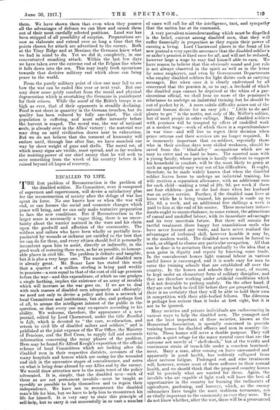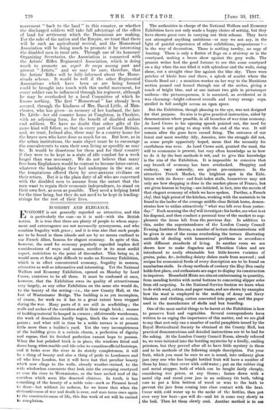RECALLED TO LIFE. T HE first problem of Reconstruction is the
problem of the disabled soldier. No Committee, were it composed of supermen and superwomen, will devise a satisfactory plan for the reconstruction of society after the deluge of war has spent its force. No one knows how or when the war will end, or can foresee the social and economic changes which peace will bring, and we can only make tentative preparation to face the new conditions. But if Reconstruction in the larger sense is necessarily a vague thing, there is no uncer- tainty about the warrior maimed in the wars and his claim upon the goodwill and affection of the community. The soldiers and sailors who have been wholly or partially inca- pacitated" by wounds or sickness are entitled to the best that we can do for them, and every citizen should feel it personally incumbent upon him to assist, directly or indirectly, in the good work of restoring these men, as far as possible, to honour- able places in civil life. The problem is definite and tangible, but it is also a very large one. The number of disabled men is• already great. Mr. Bonar Law has stated this week that a quarter of a million sterling is being paid weekly in pensiens—a sum equal to that of the cost of old-age pensions before the war—and this expenditure, of which no one grudges a single farthing, implies the existence of an army of invalids which will increase as the war goes on. If we are to deal with such masses of disabled men adequately and efficiently, we need not only to devise a policy and form a network of local Committees and institutions, but also, and perhaps first of all, to arouse the intelligent interest of the public in the question, so that every one may co-operate according to his ability. We welcome, therefore, the appearance of a new journal, edited by Lord Charnwood, under the title Recalled to Life, which is devoted to " the care, re-education, and return to civil life of disabled sailors and soldiers," and is published at the joint expense of the War Office, the Ministry of Pensions, and the Red Cross, to supply full and accurate information concerning the many phases of the problem. Here may be found Sir Alfred Keogh's exposition of the official echeme of local Committees which are looking after the disabled men in their respective districts, accounts of the many hospitals and homes which are caring for the wounded and sick in the successive stages of convalescence, and notes cn what is being done abroad by our Allies and by the enemy. We would draw attention now to the main tenet of the policy advocated. It is, simply, that the disabled men—such of them as are not permanent invalids—must be taught as speedily as possible to help themselves and to regain their independence. We have not to reconstruct the disabled • man's life for him, but we have to help him to reconstruct his life for himself. It is very easy to state this principle of -self-.help, but to carry it out successfully in so vast a number of cases will call for all the intelligence, tact, and sympathy that the nation has at its command.
A very prevalent misunderstanding which- must be dispelled is the belief, current among disabled men, that they will suffer financially in proportion as they regain their power of earning a living. Lord Charnwood places in the front of his new journal a•very specific assurance that the disabled soldier's or sailor's pension is fixed once for all, and will not be reduced, however large a wage he may find himself able to earn. We have reason to believe that this obviously sound and just rule is not always observed in the spirit as well as in the letter by some employers, and even by Government Departments who employ disabled• soldiers for light duties such as carrying messages. But when once it is clearly understood by all concerned that the pension is, so to say, a freehold of which the disabled man cannot be deprived at the whim of a par- simonious official, we shall hear no more of the pensioner's reluctance to undergo an industrial training lest he should be out of pocket by it. A more subtle difficulty arises out of the natural human desire for an easy job ; " Little to do and plenty to get " is the motto, not only of Mr. Weller's soldier, but of most people in other callings. Many disabled soldiers with pensions will be tempted by offers of unskilled work at a modest wage—work of which there is a superabundance in war time—and will live to regret their decision when peace returns and their services are no longer required. It is immensely important that ex-soldiers, especially those who in their civilian days were skilled workmen, should be saved from the blind-alley " occupations which are so easy to enter and so hard to leave. The married man with a young family, whose pension is hardly sufficient to support his household in comfort, will be the most likely to grasp at such an apparently easy way out of his difficulties. It ought, therefore, to be made widely known that when the disabled soldier leaves home to undergo an industrial training, his wife receives a separation allowance, with an additional sum for each child—making a total of 28s. 9d. per week if there are four children—just as she had done when her husband was on active service. Further, if the disabled man lives at home while he is being trained, his pension is made up to 27s. 6d. a week, and an additional five shillings a week is paid to him at the end of his course. These monetary induce- ments ought to counterbalance, to some extent, the attractions of casual and unskilled labour, with its immediate advantages and its very uncertain future. But there will remain for tactful treatment those happy but unambitious souls who have never learned any trade, and have never realized the advantages of technical skill, however humble it may be, in the modern world. The disabled men cannot be forced to work, or obliged to choose any particular occupation. All that can be done is to accustom them gradually to the idea that a man gains in dignity and repute by knowing sonic trade. In the convalescent homes light manual labour in various useful forms is encouraged, and it is made easy for men to enter the training schools that are established all over the country. In the homes and schools they must, of course, be kept under an elementary form of military discipline, and they are therefore working under artificial conditions which it is not desirable to prolong unduly. On the other hand, if they are sent back to civil life before they are properly trained', there is no certainty that they will be able to hold their own in competition with their able-bodied fellows. The dilemma is perhaps less serious than it looks at first sight, but it is not to be ignored.
Many societies and private individuals are endeavouring in various ways to help the disabled men. The youngest and not the least important of these societies, known as the Homestead Association, is specially concerned to provide training homes for disabled officers and men in country dis- tricts. These homes will serve a double purpose-. They will provide a quiet refuge for the many mental cases that arc the outcome not merely of " shell-shock," but of the terrific and continuous strain of trench-life under a ceaseless bombard- ment. Many a man, after coming on leave unwounded and apparently in good health, has suddenly collapsed from sheer nervous fatigue. Prolonged rest and wise treatment will, however, restore most of these sufferers to their normal health, and we should think that the proposed country homes will be precisely what are wanted for them. Again, the invalids who arc capable of light work will have the best of opportunities in the country for learning the rudiments of agriculture, gardening, and forestry, which, as the enemy submarines have taught the most stubborn townsman, are as vitally important to the community as ever they were. We do not know whether, after the war, there will be a pronounced movement " back to the land " in this country, or whether the discharged soldiers will take full advantage of the offers of land for settlement which the Dominions are making. For the sake of the nation and the Empire, we trust that there will be such an agricultural revival, and the Homestead Association will be doing much to promote it by interesting the disabled men in rural arts. Through one of its honorary Organizing Secretaries, the Association is connected with the Artists' Rifles Regimental Association, which is doing much to promote an esprit de corps among past and present " Artists," and we may be sure, therefore, that the Artists' Rifles will be fully informed about the Home- steads scheme. It would be well if the other Regimental Associations which have been or are being formed could be brought into touch with this useful movement, for every soldier can be influenced through his regiment, although he may be overlooked by a local Committee of which he knows nothing. The first " Homestead " has already been secured, through the kindness of Mrs. David Little, of Man- chester, who has given—in memory of her husband, the late Dr. Little—her old country home at Congleton, in Cheshire, with an adjoining farm, for the benefit of disabled sailors and soldiers. We have no doubt that other gifts of the mine kind will follow, so that in every part of Great Britain, and, we trust, Ireland also, there may be a country home for the brave men who have done so much for us. But here, as in the urban institutions, the main object must be to encourage the convalescents to earn their own living as speedily as may be. It would be disastrous for them and for their country if they were to be kept in a state of idle comfort for a week longer than was necessary. We do not believe that many free-born Englishmen would be content to become lotus-eaters, whatever the hardships they had undergone in the war, or the temptations offered them by over-anxious civilians on their return. But it is the plain duty of all who are concerned with the disabled men to assume from the outset that the men want to regain their economic independence, to stand on their own feet, as soon as possible. They need a helping hand for the time being, but they do not need to be kept in leading- strings for the rest of their lives.



































 Previous page
Previous page